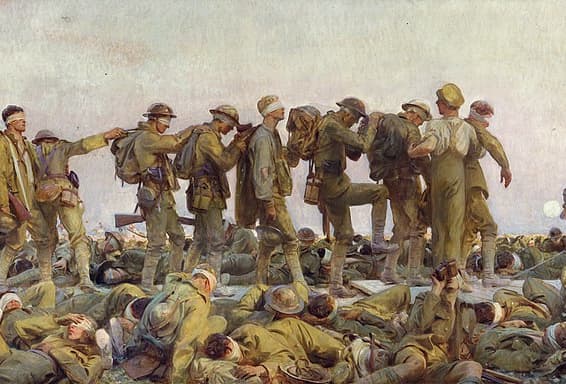Birdsong of Peace
The sound of peace arriving is recalled in The New York Sun’s adaptation for Veterans’ Day of its centenary editorial on the end of World War I.

One of the astonishing things about World War I is that for generations to come we will be able to hear it end. It was the greatest slaughter the world had ever seen. Something close to 20 million soldiers and civilians on both sides perished. Under the Armistice in which the Central Powers finally capitulated in 1918, the time for the end of the conflict was set at the 11th hour of the 11th day of the 11th month.
Until that moment, the thunder of battle engulfed the front. The machine guns crackled constantly, and the howitzers kept reporting. The sound was God-omnipresent. We know that because of recordings, including ones made near the Moselle River. Yanks were there as part of a broad push that had been ordered by the Allied commander, Marshal Foch.
With the approach of the centenary, Britain’s Imperial War Museum assembled the recordings. We first read the story in the Mirror. The record is a product of “sound ranging,” which was a technique — involving carefully placed microphones — that the Allied side used to gauge the location of enemy artillery. The recording of the last minute of the war was assembled from the record on the American front.
What gets us about it is not so much the guns, though they are unimaginably loud. This kind of battle went on for much of the four years of the war, and it is what’s to be expected in a conflict like the First World War. What the Imperial War Museum has edited captures the last minute of the war and the first minute of the peace. What caught us off guard was the first few seconds of peace.
What one hears sounds momentarily like an echo of the dying guns and then a hush falling over the battlefield — almost like rushing water. Then the quiet for a second or two. Then, blamed, if it isn’t birds starting to tweet — the birdsong of peace. Hard to tell whether the birds had been tweeting all along or whether they’re suddenly piping up amid the respite or are passing along the news.
We listened to the recording over the weekend, and re-read the most famous editorial on the outbreak of World War I. “This is the twilight of the kings,” the Chicago Tribune had boomed. “Western Europe of the people may be caught in this debacle, but never again. Eastern Europe of the kings will be remade and the name of God shall not give grace to a hundred square miles of broken bodies.”
It could be called the greatest wrong editorial of all time, which makes the recording of the last moments of the war so much more riveting. We’d tried war to end all war. We tried, in the Kellogg-Briand pact, to outlaw war. Then a war that dwarfed World War I, with as many as four times the casualties. All the more loudly echoes the silence and the birdsong that fell over the front a century ago at 11.11.11.

